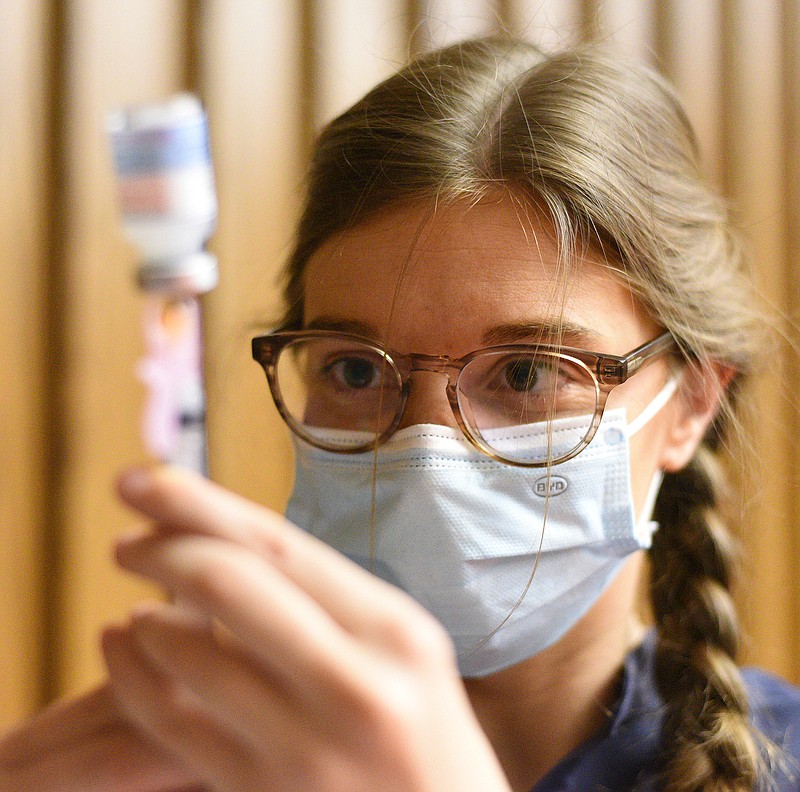Across Hamilton County, home to 374,826 residents, just over half of us - 53% - have received full vaccinations against COVID-19.
With the omicron variant in our county now and spreading across the country with lightning speed, we need at least 70% or more to be vaccinated to reduce the likelihood of more and worse variants developing.
That means about 63,720 more people here need to get the free shots. And those not yet with boosters need to get yet another jab.
The shots are proven to be safe and effective. If you have doubts, ask your doctor.
Not your lawmakers. Not the rightwing fanatics like Tennessee's supermajority General Assembly which in October voted to mandate against mandates. And not wingnuts like Georgia's U.S. Rep. Marjorie Taylor Greene, of Rome, who despite continually decrying vaccines and mandates, hasn't minded investing in three of four major COVID-19 vaccine makers during 2020. But we digress.
It's important now more than ever to set aside the misinformation and polarization that's hindering us and helping this survival-of-the-fittest virus.
The novel coronavirus is driven to live, to reproduce and to find as many work-arounds as possible to live, reproduce and do it all again and again. That's how the variants happen. They are finding work-arounds to survive - at least as long as we continue to give them a plowed field of unvaccinated people on which to practice.
For instance, omicron has developed dozens of mutations that make it harder for the past year's much-given antibody drugs from Regeneron and Eli Lilly - up to now the go-to treatments for early COVID-19 - to be effective.
We shouldn't be lulled by reports of omicron possibly being milder than the delta variant. First of all, the delta variant isn't through with us yet - primarily thanks again to vaccine hesitancy due to the unending COVID misinformation from rightwing politicians and social media.
"I think we're really just about to experience a viral blizzard," Michael Osterholm, director of the Center for Infectious Disease Research and Policy at the University of Minnesota, told CNN last week. "I think in the next three to eight weeks, we're going to see millions of Americans are going to be infected with this virus, and that will be overlaid on top of delta, and we're not yet sure exactly how that's going to work out."
Here's one possibility, according to Peter White, an expert in viral evolution who leads the White Laboratory at the University of New South Wales in Sydney, Australia. Sooner or later, (and especially if we remain slothful about vaccinating and getting vaccines to poorer countries) two good and efficient virus variants will swap weapons, making it what White calls a "recombinant."
"What happens if we take the best bits from one and the best bits from another and create a hybrid? Then we're going to get a recombinant. This happens all the time, in influenza this is how we got the 1957 and 1968 pandemics. It's mutation on a big scale, swapping genomes with each other, which is much better than if they tried to do it on their own. This is what scientists will be looking out for in their genomic sequencing," White told Bloomberg columnist David Fickling in a Q&A that we republished Sunday on the Chattanooga Times Free Press Perspectives page.
Tennessee still lags the nation both in vaccinations and in sequencing.
In Hamilton County, the first COVID vaccines were given to front-line medical workers beginning almost exactly one year ago, but by May, as shots were available to almost everyone except children, demand plummeted and vaccine hesitancy began to put this virus back on top.
Even today, with omicron and new dire forecasts, low demand continues. Even with the need for boosters and younger age groups now eligible, the health department is averaging only about 300 shots a day. At peak, the number was more than 2,000.
Last week, we talked with Elizabeth Forrester and Dawn Richards of Athena Esoterix, the only lab in the Chattanooga region conducting sequencing for coronavirus variants - and the lab that found omicron here last week. The two, who also stepped up last year to help as testing lagged, say their lab is not doing nearly as much sequencing as it could and should because our state and region hasn't yet tapped into the $1.7 billion available through the Biden administration's American Rescue Act passed in March.
They are eager to get some community conversation going about the importance of keeping a better eye on how the virus is behaving and mutating here. And we couldn't agree more.
This and increasing the number of vaccinated people is important, White summed up in the Q&A we republished: COVID-19, in its fight to survive, will change a little with everything we throw at it, but vaccines can win.
"Rubella was killing 20,000 babies a year in the U.S. before that vaccine. People forget that with polio, with rubella, even in the late 1960s, people were dying massively. Then, bang, 99% of it stopped. This virus is always going to be with us, like influenza, and it's probably going to kill more people than influenza for quite a few more years. But the only way to get on top of that is to vaccinate."
Hamilton County, we're only halfway there.
